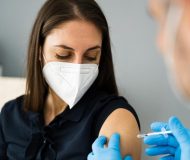

Showing the relationship between science and citizenship, social networks put the spotlight on new issues of Covid-19, such as the effects of the vaccine on menstruation. Science picked up on the new approach and showed that the SARS-CoV-2 vaccine could generate alterations in the length or pattern of menstrual cycle bleeding. Now, the analysis of more than 1,800 cycles of 371 users collected by a mobile application has made it possible to carry out a study that shows how vaccination during the luteal phase, i.e. after ovulation, could prevent the increase of the length of the menstrual cycle.
This study has been jointly developed by researchers from the Hospital de Santa Creu i Sant Pau – IIB Sant Pau, the IIIA-CSIC, the University of Geneva, and the Agency for Health Quality and Assessment of Catalonia (AQuAS). It is the result of a joint and multidisciplinary project. In this sense, Dr. Josep Perelló, assistant physician at Sant Pau’s Gynecology and Obstetrics Service, emphasizes that “the Hospital has brought the clinical vision to this work and, within this framework, the idea of stratifying the analysis by cycle phase, which has led to the main conclusion of the study”.

Everything was born following the comments of users on social networks where they highlighted alterations in the menstrual cycle after being vaccinated against COVID-19. Faced with the lack of data, App Lunar, a mobile application for monitoring the menstrual cycle, incorporated a new functionality to voluntarily record the dose, brand and country where the vaccine had been received. Among its users, 371 anonymous profiles were chosen who recorded at least five consecutive menstrual cycles, and who were in the third cycle at the time of vaccination. In total, 1855 cycles were recorded between September 2020 and February 2022.
To analyze the data, the study published in the American Journal of Obstetrics and Gynecology (one of the most relevant publications in its area), was based on the epidemiological method known as Self-Controlled Case Series, where the same person is the one who compares the previous and subsequent cycles at the time of vaccination. Therefore, the variables that were indicated were cycle length, duration of menstrual bleeding and variations in the intensity of bleeding and pain. Finally, a screening of the results was carried out according to the phase of the cycle in which the users had been vaccinated.
By observing that people who had been vaccinated during the follicular phase, i.e. before ovulation, had an average increase in cycle length of one day, while people who had been vaccinated during the luteal phase they did not show any increase. Among users vaccinated in the follicular phase, 11% experienced an increase in the duration of the menstrual cycle of more than 8 days, a clinically significant value.
Faced with these data, the study highlights the importance of the phase of the menstrual cycle at the time of vaccination to minimize the alterations of the said cycle, and concludes that vaccination during the luteal phase would avoid the potential increase in the duration of the cycle menstrual “These results, observed in the different types and brands of vaccines, are part of an important and new topic, on which there is still little evidence. Without the call to attention of so many people who menstruate and who reported these changes, studies like this would not be done”, explains Dr. Josep Perelló, who would like the analysis to be replicated with more data and with other methodologies to confirm the findings.
Dr. Perelló also emphasizes the fact that the message that needs to be conveyed to the population, and to women in particular, is “the importance of getting vaccinated. And inform women that if the vaccine is administered in the first phase of the menstrual cycle, that is, before ovulation, they may experience some type of alteration in their cycle. And that these possible alterations will be specific”.
Borja Velasco-Regulez, Jose L. Fernandez-Marquez, Nerea Luqui, Jesus Cerquides, Josep Lluis Arcos, Analia Fukelman, Josep Perelló. Is the phase of the menstrual cycle relevant when getting the covid-19 vaccine? American Journal of Obstetrics and Gynecology. 2022. ISSN 0002-9378. https://doi.org/10.1016/j.ajog.2022.07.052